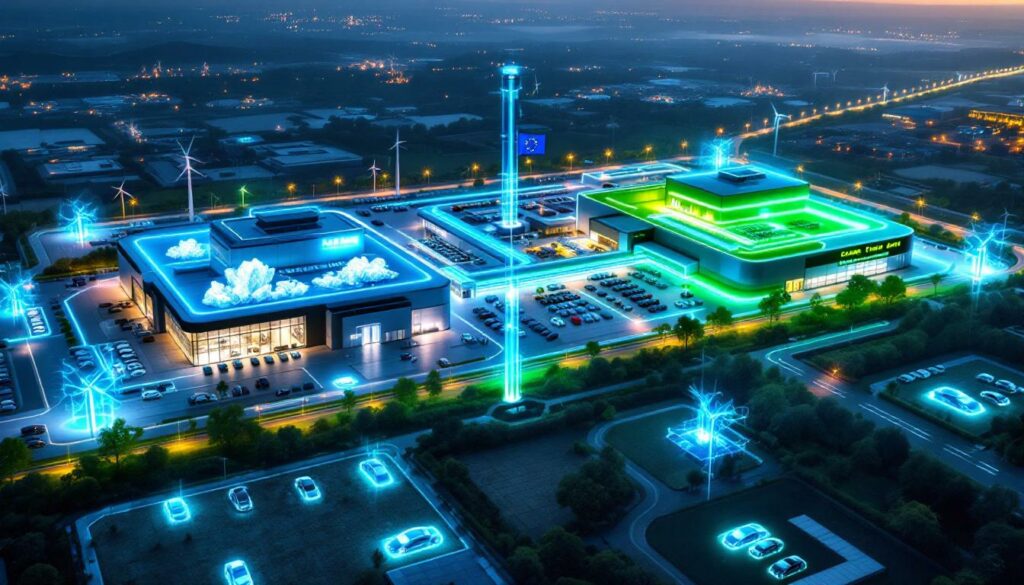Understanding the Strategic Alliance Between Rock Tech Lithium and Ronbay Technology
In a landmark development for Europe's battery supply chain, Rock Tech Lithium and Ronbay Technology have signed a Memorandum of Understanding (MoU) that promises to reshape the continent's battery materials landscape. This strategic partnership, finalized in June 2025, establishes a framework for collaboration between two key players in the battery materials sector.
The partnership spans across borders, connecting Rock Tech's German operations with Ronbay's Polish facility, creating an integrated cross-border battery materials corridor in central Europe. This geographic positioning is strategically significant as it establishes a direct supply line between lithium processing and cathode material production facilities.
"Ronbay's interest in sourcing lithium locally produced in Europe is a clear signal of strategic alignment," notes Mirco Wojnarowicz, Rock Tech's CEO. "This partnership is accelerating our shared commitment to building a resilient battery value chain in Europe."
Ronbay, headquartered in Ningbo, China, has been expanding its European presence through strategic acquisitions. Their Head of Supply Chain reinforced the partnership's vision: "Our collaboration with Rock Tech will accelerate the localisation of raw materials and strengthen our presence in the European market."
The Memorandum of Understanding (MoU) Framework
The MoU outlines several key areas of cooperation, including:
- Supply chain integration for lithium hydroxide from Germany to Poland
- Technical resource sharing and expertise exchange
- Joint market development and customer acquisition initiatives
- Investment exploration and potential financial collaboration
- Engineering and construction partner introductions
Key Players: Profiles of Rock Tech and Ronbay
Rock Tech Lithium has positioned itself as a premium lithium hydroxide producer focused on European manufacturing. Their Guben Converter project represents one of Europe's first lithium hydroxide production facilities, demonstrating their commitment to localizing critical minerals and energy transition within Europe.
Ronbay Technology has established itself as a leading producer of cathode active materials (CAM), particularly specializing in mid- and high-nickel ternary materials essential for high-performance electric vehicle batteries. Their acquisition of Johnson Matthey's cathode facility in Konin, Poland marks a significant step in their European expansion strategy.
Geographic Significance: Germany-Poland Cross-Border Collaboration
The partnership creates a strategically positioned battery materials corridor:
- Guben, Germany: Located near the Polish border, Rock Tech's converter will process lithium raw materials into battery-grade lithium hydroxide.
- Konin, Poland: Approximately 230 km east of Guben, Ronbay's facility will transform lithium hydroxide and other materials into high-performance cathode materials.
This proximity significantly reduces transportation distances and carbon footprint compared to traditional supply chains that typically source these materials from Asia.
What Production Capacity Will This Partnership Deliver?
The combined production capacity of this partnership represents a significant advancement in Europe's battery materials manufacturing capabilities, creating capacity for hundreds of thousands of electric vehicles annually.
Rock Tech's Guben Converter: 24,000 Tonnes Annual Lithium Hydroxide Production
Rock Tech's German facility is designed to produce 24,000 tonnes of battery-grade lithium hydroxide annually. This production volume represents a major milestone in European lithium processing capabilities.
"Producing 24,000 tonnes of lithium hydroxide powers over 500,000 electric vehicles per year," explains Wojnarowicz. This capacity directly addresses a critical supply chain bottleneck for European automakers who have previously relied heavily on Asian sources for battery materials.
The facility will produce battery-grade lithium hydroxide meeting stringent purity requirements of >99.5% Li₂OH·H₂O with extremely low impurity levels – essential for high-performance lithium-ion batteries.
Powering 500,000+ Electric Vehicles Annually
The partnership's combined output will directly support Europe's ambitious electric vehicle transition:
- Battery Material Requirements: A typical 60kWh EV battery requires approximately 40-50kg of lithium hydroxide
- Production Equivalency: The 24,000 tonnes annual capacity can supply materials for more than 500,000 EVs
- Market Impact: This represents approximately 15-20% of projected European EV production by 2027
This production scale demonstrates how the partnership will significantly contribute to Europe's battery supply chain independence.
Ronbay's Polish Facility: 25,000 Tonnes of Cathode Active Materials by 2026
Ronbay's facility in Konin, Poland has a targeted production capacity of 25,000 tonnes of cathode active materials annually by 2026. The plant will focus on advanced mid- and high-nickel ternary cathode materials, which are crucial components for high-energy-density batteries preferred by premium automotive manufacturers.
Ronbay brings significant expertise to the partnership, having established supply relationships with major battery producers, including Chinese manufacturer WeLion. This experience will be invaluable as they expand European production to serve regional automotive manufacturers.
Why Is This Partnership Strategically Important for European Battery Manufacturing?
The Rock Tech-Ronbay partnership addresses several critical strategic imperatives for European battery manufacturing, creating a more resilient and independent supply chain.
Localizing Critical Battery Materials Production
Europe has set ambitious goals to develop its battery industry, but has faced significant challenges in localizing the production of critical materials. Currently, the continent remains heavily dependent on imports for both lithium hydroxide and cathode materials.
This partnership enables 100% European production localization for these crucial components, addressing a major vulnerability in the supply chain. By establishing regional production capacity, European manufacturers gain greater control over quality, costs, and environmental standards.
"Accelerating local production of critical battery materials is essential to building a resilient battery value chain in Europe," emphasizes Rock Tech's CEO. This localization strategy aligns perfectly with broader European industrial policy objectives.
Reducing Supply Chain Dependencies on Asia
Europe's current battery supply chain is characterized by significant dependencies on Asian suppliers, particularly from China, South Korea, and Japan. This dependency creates vulnerabilities related to:
- Supply disruptions from geopolitical tensions
- Transportation delays and logistics challenges
- Reduced visibility into production practices and standards
- Limited ability to ensure compliance with European environmental regulations
The Rock Tech-Ronbay partnership directly addresses these vulnerabilities by establishing European production capacity for two critical battery components. This reduces transportation distances from thousands of kilometers to just a few hundred, dramatically improving supply chain resilience.
Creating an Integrated Battery Materials Ecosystem
Beyond simply localizing production, the partnership contributes to the development of an integrated battery materials ecosystem in central Europe. This integration provides several advantages:
- Reduced transportation emissions: Shorter supply chains mean lower carbon footprint
- Quality control: Direct coordination between lithium hydroxide and cathode production
- Innovation acceleration: Closer collaboration enables faster technical improvements
- Regional economic development: Creation of high-skilled jobs and industrial capabilities
This ecosystem approach creates multiplicative benefits that exceed the simple sum of the individual production facilities.
How Does This Deal Support Europe's Battery Industry Ambitions?
The Rock Tech-Ronbay partnership directly supports Europe's strategic objectives for battery industry development, aligning with key policy initiatives and industrial strategy goals.
Alignment with EU Critical Raw Materials Act
While not explicitly mentioned in the source material, this partnership clearly supports the objectives of the EU Critical Raw Materials Act (CRMA), which aims to:
- Secure sustainable access to critical raw materials
- Diversify supply from third countries
- Improve domestic capacity for extraction, processing and recycling
- Strengthen circularity and sustainability
The Rock Tech-Ronbay partnership particularly addresses the processing aspect, creating European capacity for converting lithium into battery-grade materials rather than exporting raw materials for processing elsewhere.
Note: The specific alignment with CRMA targets would benefit from additional authoritative sources beyond the initial announcement.
Contribution to European Battery Alliance Goals
The European Battery Alliance (EBA) was launched in 2017 with the goal of creating a competitive and sustainable battery manufacturing industry in Europe. This partnership advances several core EBA objectives:
- Building European capacity across the entire battery value chain
- Securing access to raw materials for battery production
- Developing European technological leadership in the sector
- Supporting the transition to clean mobility and energy storage
By establishing integrated production of lithium hydroxide and cathode materials, the Rock Tech-Ronbay partnership fills critical gaps in Europe's battery value chain.
Competitive Positioning Against Asian Battery Supply Chains
The partnership strengthens Europe's competitive position against established Asian battery supply chains in several ways:
- Scale economies: Combined production volumes create meaningful scale
- Integration advantages: Direct coordination between lithium hydroxide and cathode production
- Reduced logistics costs: Proximity significantly cuts transportation expenses
- Tailored specifications: Direct collaboration enables customization for European automakers
This competitive positioning is crucial for Europe to establish itself as a serious contender in global battery production rather than simply a consumer market for Asian-produced batteries.
What Technical Collaboration Is Planned Between the Companies?
The partnership includes several dimensions of technical collaboration that will enhance both companies' capabilities and accelerate implementation.
Engineering and Construction Support from Ronbay
A key aspect of the technical collaboration involves Ronbay providing experienced engineering partners to support Rock Tech's Guben Converter project. This support leverages Ronbay's experience in building and operating similar facilities.
"Ronbay will introduce experienced engineering partners, enhancing our ability to fast-track execution," notes Rock Tech's CEO. This knowledge transfer represents a significant advantage for Rock Tech as they implement their first commercial-scale lithium hydroxide facility.
The engineering collaboration may include:
- Design optimization for compatibility with downstream cathode production
- Construction methodology and project management expertise
- Equipment selection and vendor relationships
- Commissioning and ramp-up strategies
Technology Transfer Opportunities
While specific technology transfer protocols weren't detailed in the source material, the partnership creates natural opportunities for knowledge exchange between the companies:
- Lithium hydroxide processing optimization from Rock Tech to Ronbay
- Cathode material production expertise from Ronbay to Rock Tech
- Joint development of interface specifications between materials
- Shared testing methodologies and quality control systems
This bilateral knowledge flow benefits both companies and accelerates the overall implementation timeline.
Quality Standards and Specifications Alignment
A critical aspect of technical collaboration involves aligning quality standards and specifications between lithium hydroxide and cathode materials. This alignment ensures optimal performance in the final battery products.
The partnership enables:
- Joint development of material specifications
- Coordinated quality control methodologies
- Shared testing and validation protocols
- Collaborative troubleshooting of technical challenges
This technical alignment represents a significant advantage over disconnected supply chains where material producers operate independently.
What Are the Investment Implications of the Partnership?
The partnership creates significant investment implications for both companies and potentially for external investors interested in Europe's battery metals investment landscape.
Joint Investment Exploration Framework
The MoU establishes a framework for exploring joint investment opportunities between Rock Tech and Ronbay. While specific financial figures weren't disclosed in the source material, Ronbay has committed to providing "potential investment" for the Guben development.
This joint investment approach offers several advantages:
- Risk sharing: Distributing financial risk across both companies
- Complementary expertise: Combining technical and market knowledge
- Enhanced market access: Leveraging both companies' customer relationships
- Capital efficiency: Optimizing investment across the integrated supply chain
The exploration framework suggests a phased approach to investment decisions as the partnership develops.
Capital Requirements for Facility Development
Developing advanced materials manufacturing facilities requires substantial capital investment. While exact figures for these specific projects weren't disclosed, industry benchmarks suggest:
- Lithium hydroxide conversion facilities typically require $400-700 million investment for ~25,000 tonne capacity
- Cathode active material plants generally require $300-500 million for similar capacity
These capital requirements highlight the significance of the partnership's investment dimension and the importance of coordinated financial planning.
Potential Economic Impact on Regional Development
Beyond company-specific investment, the partnership has significant implications for regional economic development:
- Direct employment: Creation of hundreds of high-skilled technical positions
- Indirect employment: Supply chain and service provider opportunities
- Industrial capability development: Building advanced manufacturing expertise
- Knowledge ecosystem: Attracting related businesses and research activities
These economic development impacts make the partnership particularly significant for the Brandenburg (Germany) and Greater Poland regions where the facilities are located.
How Will This Partnership Affect Automotive Supply Chains?
The Rock Tech-Ronbay partnership promises to significantly reshape automotive supply chains in Europe, particularly for electric vehicle manufacturers.
Securing Offtake Agreements with European Automakers
A core element of the partnership strategy involves securing offtake commitments from European battery and automotive manufacturers. As noted in the source material, the collaboration includes joint market development and customer acquisition initiatives.
This approach offers several advantages:
- Supply security: Guaranteed access to critical materials for automakers
- Price stability: Long-term agreements that reduce market volatility
- Specification alignment: Direct collaboration on material requirements
- Strategic coordination: Synchronized capacity expansion planning
These offtake agreements create a foundation of stability that benefits both material producers and automotive manufacturers.
Shortening Supply Chain Distance for EV Manufacturers
One of the most significant impacts of the partnership is the dramatic reduction in supply chain distances for European automakers:
| Supply Chain Scenario | Typical Distance | Carbon Footprint Impact |
|---|---|---|
| Traditional Asian Supply | 8,000+ km | High (shipping emissions) |
| Rock Tech-Ronbay Supply | ~230 km | Significantly reduced |
This proximity delivers several key benefits:
- Reduced logistics costs: Lower transportation expenses
- Improved supply chain resilience: Less vulnerability to shipping disruptions
- Enhanced responsiveness: Faster adaptation to specification changes
- Lower carbon footprint: Alignment with automakers' sustainability goals
The shortened supply chain directly addresses several pain points currently experienced by European EV manufacturers.
Ensuring Battery-Grade Material Quality for Premium Vehicles
European automakers, particularly in the premium segment, have exceptionally high quality standards. The partnership's integrated approach enhances quality assurance through:
- Direct coordination between lithium hydroxide and cathode production
- Shared quality control methodologies and standards
- Reduced quality risks from lengthy transportation
- Collaborative problem-solving when quality issues arise
This quality assurance capability is particularly valuable for premium automotive manufacturers where battery performance directly impacts brand reputation.
What Challenges Must the Partnership Overcome?
While the partnership offers significant opportunities, it must navigate several challenges to achieve its full potential.
Regulatory Approval Processes
Establishing new chemical production facilities in Europe involves navigating complex regulatory frameworks:
- Environmental permits: Comprehensive environmental impact assessments
- Chemical safety regulations: REACH compliance and hazardous material handling
- Land use approvals: Local planning and zoning requirements
- Water usage authorizations: Critical for lithium hydroxide production
Successfully navigating these regulatory processes requires specialized expertise and close coordination with relevant authorities.
Technical Hurdles in Scaling Production
Scaling up advanced materials production presents several technical challenges:
- Process optimization: Achieving consistent quality at commercial scale
- Yield management: Maximizing conversion efficiency
- Energy efficiency: Minimizing production costs and carbon footprint
- Automation implementation: Ensuring consistent operation with reduced labor inputs
The partnership's technical collaboration dimension directly addresses these scaling challenges by combining both companies' expertise.
Market Competition from Established Suppliers
Despite the advantages of local production, the partnership faces competition from established suppliers:
- Asian incumbent advantage: Existing relationships and proven track records
- Scale economies: Larger Asian producers may have cost advantages
- Technical maturity: Well-optimized production processes refined over years
- Market access: Established supply agreements with battery manufacturers
Successfully competing against these incumbents requires delivering compelling advantages in terms of quality, sustainability, supply security, and potentially government support.
What Timeline Is Expected for Implementation?
The partnership outlines an ambitious implementation timeline aimed at bringing new capacity online within the next 2-3 years.
Converter Construction and Commissioning Phases
Rock Tech's Guben Converter project involves several implementation phases:
- Detailed engineering: Finalizing technical specifications and process design
- Permitting completion: Securing all necessary regulatory approvals
- Site preparation: Ground preparation and infrastructure development
- Construction phase: Building the physical production facility
- Equipment installation: Installing specialized production equipment
- Commissioning: Testing and validating all systems
- Qualification: Producing test batches for customer approval
While specific milestones weren't detailed in the source material, industry benchmarks suggest a 24-36 month timeline from investment decision to production.
Production Ramp-Up Schedule
Following initial commissioning, both facilities will undergo carefully managed production ramp-ups:
- Initial production: Limited volumes with extensive quality monitoring
- Customer qualification: Material validation by battery and automotive customers
- Volume scaling: Gradual increase in production quantities
- Efficiency optimization: Continuous improvement of production parameters
This phased approach ensures quality consistency while steadily increasing production volumes.
Full Operational Capacity Projections
According to the source material, the partnership targets the following operational timelines:
- Ronbay Konin Plant: 25,000 tonnes of cathode materials by 2026
- Rock Tech Guben Converter: 24,000 tonnes of lithium hydroxide by 2026-2027
These aligned timelines create a synchronized capacity expansion that ensures supply chain coordination between the two critical materials.
FAQ: Rock Tech and Ronbay Partnership
What specific battery materials will be produced through this partnership?
The partnership will produce two essential battery materials:
- Battery-grade lithium hydroxide (Rock Tech's Guben facility) – A critical precursor for cathode production
Ready to Capitalise on the Next Major Mineral Discovery?
Discover how significant ASX mineral discoveries can lead to exceptional market returns with Discovery Alert's proprietary Discovery IQ model, transforming complex mineral data into actionable investment insights. Explore historic examples of extraordinary discovery outcomes by visiting our dedicated discoveries page and begin your 30-day free trial today.




